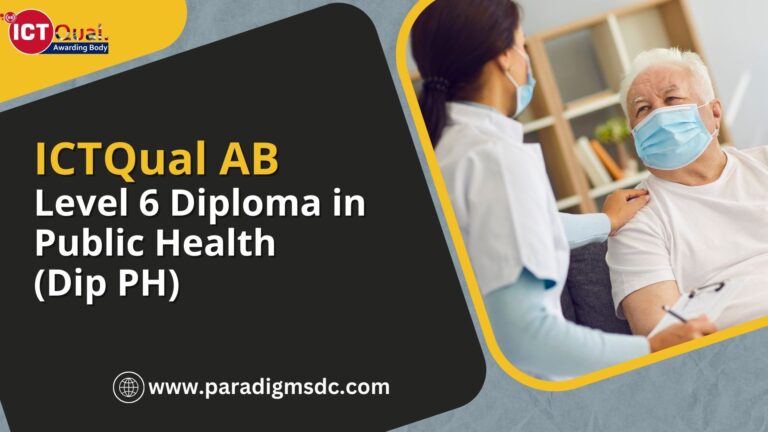Course Introduction
In emergency situations, the immediate response can make the difference between life and death. The ICTQual Level 2 Award in Principles of Community First Response is designed to equip individuals with the essential skills and knowledge to provide critical assistance in the moments before professional medical help arrives. This course empowers participants to act confidently and competently, ensuring community safety and resilience.
Course Overview
The ICTQual Level 2 Award in Principles of Community First Response is a comprehensive program that covers a wide range of emergency scenarios. It emphasizes the importance of prompt and efficient first aid, offering practical training and theoretical knowledge. Participants will learn to handle various medical emergencies, from minor injuries to life-threatening conditions, and understand the critical role they play in the chain of survival.
Course Study Units
- Introduction to Community First Response
- Emergency Assessment and Scene Management
- Basic Life Support (BLS) Skills
- Medical Emergencies
- Trauma Management
- Effective Communication and Teamwork
- Ethical and Legal Considerations
- Psychological First Aid
Learning Outcomes
By the end of this course, participants will be able to:
Introduction to Community First Response
- Understanding of Community First Response:
- Define the concept of community first response and its role in emergencies.
- Explain the importance of community involvement in emergency response.
- Roles and Responsibilities:
- Identify the roles and responsibilities of community first responders.
- Understand the importance of effective communication and coordination within the community response framework.
Emergency Assessment and Scene Management
- Rapid Assessment Skills:
- Demonstrate the ability to quickly assess emergencies.
- Prioritize actions based on the severity of injuries and the safety of the scene.
- Scene Safety:
- Identify potential hazards in the emergency scene.
- Implement strategies to ensure the safety of oneself, bystanders, and the casualty.
Basic Life Support (BLS) Skills
- CPR Techniques:
- Perform CPR on adults, children, and infants according to current guidelines.
- Demonstrate proper hand placement, compression depth, and timing for effective CPR.
- AED Operation:
- Operate an automated external defibrillator (AED) safely and effectively.
- Recognize when to use an AED and follow the correct protocols for its deployment.
Medical Emergencies
- Recognition and Initial Management:
- Identify common medical emergencies such as heart attacks, strokes, and allergic reactions.
- Initiate appropriate first aid interventions to stabilize the condition of the casualty.
- Administration of First Aid:
- Administer basic first aid treatments, including wound care and medication administration.
- Position casualties for optimal comfort and safety during medical emergencies.
Trauma Management
- Assessment and Treatment:
- Assess and manage traumatic injuries, including wounds, fractures, and burns.
- Control bleeding and immobilize injured limbs effectively.
- Pain Management:
- Provide pain relief and comfort to casualties with traumatic injuries.
- Maintain the safety and dignity of the casualty throughout the treatment process.
Effective Communication and Teamwork
- Clear Communication:
- Communicate effectively with emergency dispatchers, professional responders, and other community members.
- Relay accurate information and coordinate resources efficiently.
- Team Coordination:
- Collaborate with other responders and bystanders to optimize the response to emergencies.
- Demonstrate effective teamwork skills to achieve the best possible outcomes for casualties.
Ethical and Legal Considerations
- Ethical Principles:
- Apply ethical principles such as respect for autonomy and beneficence in emergency response situations.
- Consider the ethical implications of decisions made during emergencies.
- Legal Frameworks:
- Understand the legal obligations and responsibilities of community first responders.
- Ensure compliance with relevant laws and regulations governing emergency care.
Psychological First Aid
- Recognition of Psychological Impact:
- Recognize the psychological impact of emergencies on individuals and communities.
- Demonstrate empathy and understanding towards those experiencing emotional distress.
- Supportive Interventions:
- Provide emotional support and practical assistance to individuals in crisis.
- Employ techniques of psychological first aid to promote resilience and facilitate recovery.
Course Benefits
- Enhanced Skills and Confidence: Gain practical skills that can be applied in real-life emergencies, boosting confidence to act promptly and effectively.
- Community Impact: Contribute to community safety and resilience by being prepared to assist in emergencies.
- Professional Development: Enhance your CV with a recognized qualification, opening doors to roles in healthcare, emergency services, and community support.
- Personal Fulfillment: Experience the satisfaction of knowing you can make a significant difference in critical situations.
Who is This Course For?
The ICTQual Level 2 Award in Principles of Community First Response is ideal for:
- Community Volunteers: Individuals looking to contribute to their local community’s safety.
- Healthcare Professionals: Those seeking to refresh or enhance their emergency response skills.
- Teachers and Coaches: Professionals responsible for the safety of children and young adults.
- Employees in High-Risk Environments: Workers in industries where accidents and injuries are common.
- General Public: Anyone interested in learning lifesaving skills and being prepared for emergencies.
Future Progression
Upon completing the ICTQual Level 2 Award in Principles of Community First Response, participants may consider advancing their knowledge and skills through:
- ICTQual Level 3 Award in Emergency First Aid at Work: A more advanced course focusing on workplace first aid.
- ICTQual Level 3 Certificate in First Response Emergency Care (FREC): For those looking to pursue a career in emergency medical response.
- Advanced Life Support (ALS) Courses: Specialized training for healthcare professionals seeking higher-level qualifications.
Embark on a journey to become a vital link in your community’s chain of survival. Enroll in the ICTQual Level 2 Award in Principles of Community First Response and be prepared to make a difference when it matters most.







